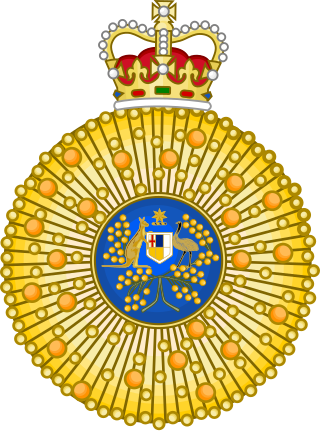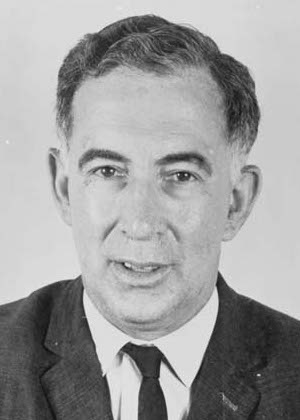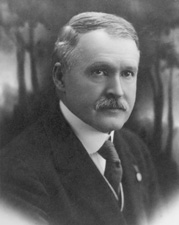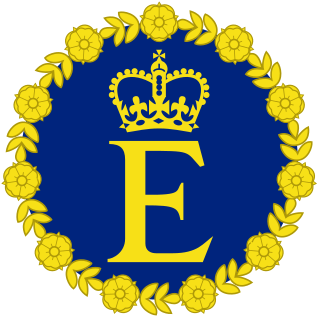Related Research Articles

The Order of Australia is an Australian honour that recognises Australian citizens and other persons for outstanding achievement and service. It was established on 14 February 1975 by Elizabeth II, Queen of Australia, on the advice of then prime minister Gough Whitlam. Before the establishment of the order, Australians could receive British honours, which continued to be issued in parallel until 1992.

Sir Zelman Cowen, was an Australian legal scholar and university administrator who served as the 19th Governor-General of Australia, in office from 1977 to 1982.

The New Zealand Social Credit Party was a political party that was New Zealand's third party from the 1950s to the 1980s. It won representation in the New Zealand House of Representatives, holding one seat at times between 1966 and 1981, and two seats from 1981 to 1987. While Social Credit once had significant support, particularly as a protest vote, it was disadvantaged by first-past-the-post voting as it had no geographically concentrated vote. Its most identifiable leaders were Vernon Cracknell (1963-70), who served just one term in parliament, and the household name Bruce Beetham, who rebuilt the party into a significant political force. At its zenith under Beetham in 1981, Social Credit achieved an unprecedented 20.7% of the vote.

Sir Robert James Charles is a New Zealand professional golfer who won the 1963 Open Championship, the first left-handed player to win a major championship. He won the 1954 New Zealand Open as an 18-year-old amateur and made the cut in the same event in 2007, at the age of 71. His achievements over that period, in which he won 80 tournaments, rank him as one of the most successful New Zealand golfers of all time. He is, along with Michael Campbell, one of only two New Zealanders to win a men's major golf championship.

Sir Michael Hardie Boys, was a New Zealand lawyer, judge and jurist who served as the 17th Governor-General of New Zealand, in office from 1996 to 2001.

Horace Julian Bond was an American social activist, leader of the civil rights movement, politician, professor, and writer. While he was a student at Morehouse College in Atlanta, Georgia, during the early 1960s, he helped establish the Student Nonviolent Coordinating Committee (SNCC). In 1971, he co-founded the Southern Poverty Law Center in Montgomery, Alabama, and served as its first president for nearly a decade.

The monarchy of New Zealand is the constitutional system of government in which a hereditary monarch is the sovereign and head of state of New Zealand. The current monarch, King Charles III, acceded to the throne following the death of his mother, Queen Elizabeth II, on 8 September 2022 in the United Kingdom. The King's elder son, William, Prince of Wales, is the heir apparent.

Republicanism in New Zealand is the political position that New Zealand's system of government should be changed from a constitutional monarchy to a republic.
Far-right politics in New Zealand has been present in New Zealand in the form of the organised advocacy of fascist, far-right, neo-Nazi, white supremacist, and anti-Semitic views by various groups, although fascism has never gained a strong foothold.
The New Zealand Republican Party of 1967 was a political party which campaigned for the creation of a New Zealand republic. It was founded by Bruce Jesson in 1967, and was linked to the Republican Association.

The New Zealand Open is the premier men's golf tournament in New Zealand. It has been a regular fixture on the PGA Tour of Australasia tournament schedule since the 1970s. The 2019 event was the 100th edition of the tournament. Since 2014 it has been held as a pro-am in February or March.
Bruce Edward Jesson was a journalist, author and political figure in New Zealand.

Dame Catherine Anne Tizard was a New Zealand politician who served as mayor of Auckland City from 1983 to 1990, and the 16th governor-general of New Zealand from 1990 to 1996. She was the first woman to hold either office.
Deane Chandler Davis was an American attorney and insurance executive from Vermont. Long active in Republican politics, he is most notable for his service as the 74th governor of Vermont from 1969 to 1973.

Selden Palmer Spencer was an American lawyer and politician. A Republican, he was a United States Senator from Missouri.

Stanley Calef Wilson was an American politician, attorney, and businessman from Vermont. He served as the 57th lieutenant governor of Vermont from 1929 to 1931 and the 62nd governor of Vermont from 1931 to 1935.

Queen Elizabeth II had a variety of flags to represent her personally and as head of state of several independent nations around the world. They were usually used on any building, ship, car, or aircraft where she was present.
Eva Esther Hill was a New Zealand medical doctor, medical superintendent, writer, publicist and health campaigner.
The Liberal Reform Party was a rural based political party in New Zealand. It was the successor to the Country Party that contested the 1969 election.

Muriel Florence Lloyd Prichard (1905–1991) was a British academic, economist, and writer.
References
- ↑ "ROYAL TOUR OPPOSED". The Press. 25 February 1966. p. 14. Retrieved 21 September 2024– via Papers Past.
- ↑ "CHANGE OF NAME". The Press. 18 June 1966. p. 20. Retrieved 21 September 2024– via Papers Past.
- ↑ "STUDENTS BURN UNION JACK". The Press. 20 August 1966. p. 1. Retrieved 21 September 2024– via Papers Past.
- ↑ "Queen's Head Defaced". The Press. 5 August 1967. p. 1. Retrieved 21 September 2024– via Papers Past.
- ↑ Gavin McLean (October 2006), The Governors, New Zealand Governors and Governors-General, Otago University Press, p. 281